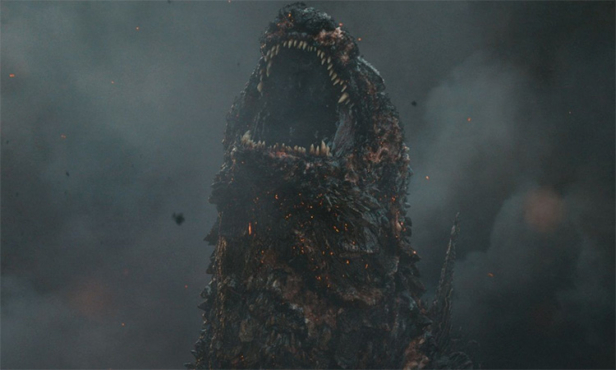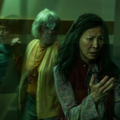Godzilla Minus One begins at the end. It is 1945, Japan’s wartime defeat is now a foregone conclusion and, whether out of fear, or perhaps in obedience of his parents’ injunction to live, pilot Koichi Shikishima (Ryunosuke Kamiki) aborts his final flight as a kamikaze. He heads to the aeronautical base on Odo Island, where he claims that his plane was malfunctioning – even though the head engineer Sōsaku Tachibana (Munetaka Aoki) can see that it is in good working order. Shortly after a dinosaur-like creature, known to locals as Godzilla, emerges from the water. Only Shikishima’s plane is equipped with heavy artillery, but when the moment comes to fire on Godzilla, the terrified pilot freezes – and the monster, unchecked, kills every soldier there except Shikishima and Tachibana. Shikishima returns to a Tokyo that has been fire-bombed to near oblivion, and finds his parents dead. Left with nothing but the ruins of his old house, he takes in the homeless Noriko (Minami Hamane) who herself has adopted an orphaned baby girl, and together, with help from the neighbour Sumiko (Sakura Ando), these three form a tentative family unit. The monster of the past, however, will soon resurface, much larger and newly irradiated in the wake of the first US nuclear test at Bikini Atoll in 1946, to wreak further havoc upon these already fragile lives, as they attempt to redefine themselves.
These are the two contradictory poles that lend Godzilla Minus One its principal tension. On the one hand, there is the impulse to rebuild, to forge new connections, to live again and to embrace the hope of a better future, while on the other hand there is the deep trauma, the survivor’s guilt and the desire for revenge that keep characters like Shikishima unable fully to let go of their past or to consider their war over. Ashamed at his failure either to fulfil a suicide mission or to save others around him, Shikishima is so fixated on the death which he feels is his due that he agrees to take on dangerous mine-clearing work with fellow veterans Kenji Noda (Hidetaka Yoshioka) and Yōji Akitsu (Kuranosuke Sasaki) and young wannabe warrior Shirō Mizushima (Yuki Yamada). Several times Shikishima will even wonder aloud to Noriko whether he is really still alive or just a dead soldier’s haunted ghost. His undead status reflects the state of a nation struggling to emerge, dazed and zombie-like, from the mass graveyards of war – and here Godzilla both instantiates Shikishima’s nightmarish (self-)destructive fantasies, and also offers him and other ex-soldiers a chance at redemption and making good on past failures. This time, Shikishima and his comrades are facing the enemy of their own free will, and, in a new ideology that radically breaks from Japan’s recent Imperialist past, choosing life over death.
The subtitle Minus One comes with multiple resonances. For this is a prequel of sorts, set some years before Ishirō Honda’s original Godzilla (1954) while inventively recreating several of that film’s key scenes (Odo Island, the news crew filming a rampage, Godzilla’s attack on a train and naval vessels) while showing them from radically different perspectives. Yet the title also refers to the Ground Zero left by America’s air raids on Tokyo, not to mention the nuclear annihilation of Hiroshima and Nagasaki, repeated by Godzilla’s destructive onslaughts which take the city back even further. The ‘Zero’ was also, of course, the nickname of the fighter aircraft favoured for kamikaze missions. These characters who only want to move on from their country’s devastation instead keep being taken back to less than zero by a monstrous force that will not allow them the peace that they crave.
Written and directed by Takashi Yamazaki who, together with Kiyoko Shibuya, also created the visual effects, this thirtieth live-action Godzilla film produced in Japan is an epic kaiju feature that captures a nation in violent transition from its recent wartime past, and in search of different values. As sombre and serious in tone as the OG, Godzilla Minus One boasts a creature that is terrifying in its gargantuan scale, its immense power and its relentless aggression, as the embodiment of Japan’s despair, and as a focus for a new civilian solidarity. This is Godzilla come back before he had even arrived, paradoxically – some might say improbably – inserting himself a little ahead of the 1954 film’s timeline, in a glimpse of the series’ prehistory that inevitably promises subsequent returns. For if Japan can regenerate itself and rise again, so too can Godzilla…
Godzilla Minus One will be released in US cinemas on 1 December and in UK cinemas on 15 December. Find more reviews at SciFiNow.
strap: [4/5 stars]



